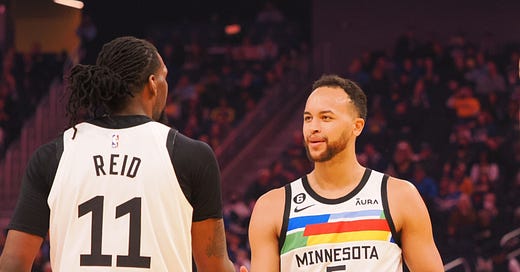Deep Dive: The Timberwolves Traded In Bench Volatility For Spacing and Solidity
If Minnesota is going to find improvements next season, they'll be relying on their bench to provide more. This time around, that seems plausible.
The Minnesota Timberwolves’ bench production was a problem that seemed to simmer unnoticed beneath the pile of more glaring issues last season.
It was a group that never had stability in personnel, that much was obvious. The Wolves were forced to draft in end-of-bench players when the injury bug incessantly latched its mandible around the team, but no matter what iteration Chris Finch trialed, a consistent lack of output followed.
When you look at the projected reserves for next season, things look a lot different.
Players like Jaylen Nowell, Austin Rivers, Matt Ryan and Bryn Forbes were all sighted far too often last season, and all of them are now team-less and floundering in the free agent pool. Jordan McLaughlin returns for the final year of his contract, but he will likely be demoted back to a more fitting third point guard role.
Those five players totaled 3395 minutes last season, meaning 17.1 percent of the team’s total minutes were frittered on players who were untenably bad.
Now, with Taurean Prince — one of the only reliable bench producers — off to Hollywood to join the Los Angeles Lakers, Minnesota’s bench is getting a much-needed, and perhaps underrated, makeover.
Over the course of the regular season, the untrustworthy bench was outscored by 73 points — ranking 23rd leaguewide — while shooting 32.4 percent from long-range; the third-worst clip among the league’s reserve units. In the playoffs, those numbers somehow plummeted again. They were outscored by 24 points over their five outings (second-worst among the 16 playoff participants) and shot a ghastly 28.3 percent from deep.
No matter what players floated in and out of the rotation, they mostly failed to help Minnesota’s starting unit. The starters ranked sixth among other Western Conference starting units in net rating (+1.1) and 13th overall. The bench ranked 10th in the West and 20th overall, per NBA Stats.
They didn’t draw meaningful fouls and eke out free throw attempts, ranking 19th in free throws per 100 possessions. They, like the team as a whole, failed to rebound, securing just 16.4 rebounds per 100 possessions and ranking 29th among the league’s bench units. And, maybe most critically in today’s offense-heavy league, they didn’t score enough, ranking 16th in points per 100 possessions (47.4), per NBA Stats.
It was the volatility that ultimately orchestrated their downfall. Minnesota’s reserves weren’t always horrific — they were prone to firework displays that lifted them to big wins throughout the campaign — they just had no consistency. Nowell was scorching hot or icy cold. McLaughlin was setting the tone or digging their grave. Prince was everything they needed or far too much for a bit-part player. Rivers, Forbes, Ryan and the rest of the end-of-bench call-ups were mostly just anchors tied around the team’s ankle.
Karl-Anthony Towns’ long-term injury didn’t help, nor did the irksome minor injuries that cropped up for Prince, Kyle Anderson and Rudy Gobert, but this was a bench that was built on a house of cards. It didn’t take much of a breeze to shatter them.
Volatility isn’t something the Timberwolves can afford from their bench; they already have enough of it coursing through their starting lineup. From Anthony Edwards to Towns to Gobert, they could just as quickly steal a game away from the opposition as they can filch a victory away from themselves.
For the upcoming season, the front office needed to build a bedrock beneath that starting five, one that can mix in with the big dogs or operate as a standalone unit. One that can be relied upon to do certain things and then do them again and then keep doing them throughout the taxing marathon that is the regular season. Then, they needed one that isn’t going to become a blade lingering at their throat when the playoffs roll around.
Nobody can predict whether injuries will force the Wolves to reach deep into their bench again next season, but what they’ve done at last season’s trade deadline and during this summer’s free agency frenzy should fatten up their bench stocks if they can stay healthy while providing some more insulation if they do deal with more injuries to key players.
Keep reading with a 7-day free trial
Subscribe to Howls and Growls to keep reading this post and get 7 days of free access to the full post archives.




